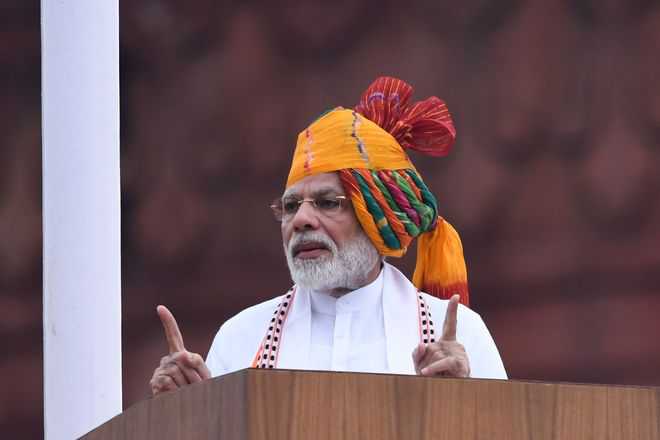
Prime Minister Narendra Modi
KV Prasad
Tribune News Service
New Delhi, August 18
Prime Minister Narendra Modi has flagged the issue of the country’s march in the sphere of population stabilisation and the need to address the challenge brought to the fore, an issue that has for long remained outside public discourse.
The last time the matter figured was in a Lok Sabha discussion on population stabilisation on August 4, 2010, in which members across the political spectrum took part in the debate. Interestingly, in his opening remarks the then Health and Family Welfare Minister, Ghulam Nabi Azad, underscored the issue came up for discussion after 33 years.
Ever since the infamous ‘forced sterilisations’ during the 1975-77 Emergency when the government pursued with vigour family planning programme, the issue remained in the realm which successive governments preferred not to talk about.
So much so, sensing how the topic touched a raw nerve, the Morarji Desai-led Janata Party government rechristened the controlling ministry as Ministry of Family Welfare to erase bitter memories of erstwhile Ministry of Family Planning. In other words, the stigma around it made the subject toxic if not radioactive for politicians to approach it.
Based on what was last said in the House in 2010 by members, there appears to be a broad consensus among parties that the country right from those governing at the Centre to the panchayats on the need to come up with innovative ideas and incentivise people to adopt smaller families.
Azad then said even the mid-term targets to bring down Total Fertility Ratio to replacement level by 2010 – envisaged in the National Population Policy (NPP) in 2000 — was behind schedule. Yet, there is a hope since across all regions, 14 states moved ahead on the path without any law, martial law, coercion, threat and the question to look is why states lagging behind cannot emulate. What was required is change in the mindset.
The NPP long-term objective is to achieve stable population by 2045 at a level consistent with the requirements of sustainable economic growth, social development and environmental protection. Even in 1953, the Family Planning Research and Programme Committee underscored “that family planning programmes should not be conceived of in the narrow sense of birth control or merely spacing of birth of children but to promote, as far as possible, the growth of the family as a unit or society…from the social, economic and cultural points of view.”
In 1978, then Punjab MP Sat Paul Mittal created an NGO, Indian Association of Parliamentarians on Population and Development, which continues to do work in the field to facilitate the role of elected representatives in resolving the problems of population and development. In 2006, Parliamentary Forum on Population and Public Health was set up which among other things was to have focussed discussions on strategies relating to population stabilisation.
So over the years, lawmakers have been conscious of the problem and the challenges. The need at best is to refocus energies while being mindful of approach of overzealous authorities.



























